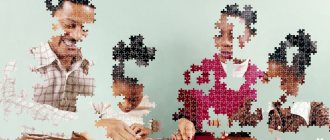Introjection is an unconscious psychological defense mechanism. From the Latin “intro” - inside and “jacio” - put - the process of an individual transferring subjective images of external objects, concepts, patterns into the unconscious space. It was introduced into the terminology of psychoanalysis in 1909 by a follower of Sigmund Freud, a psychoanalyst of Hungarian origin, Sandor Ferenczi.
Freud, who did not differentiate between identification and introjection, attached importance to the protective aspect of the mechanism, highlighting separately identification with the aggressor, the concept of which became the basis for the psychoanalytic explanation of Stockholm syndrome. Introjection was separated out separately later, designated as a primitive, archaic model of identification with the main difference in the complete unconsciousness of the creation of introjection. Freud considered introjection the foundation of the Oedipus complex - wanting to undividedly own the mother, and without the possibility of competing with the paternal figure, the child identifies himself with her, introjects the maternal image into the unconscious. And therefore, in the role of a sexual idealized object, he sees women most similar to his mother. Accordingly, the introjection of women has opposite heroes and was later called the Electra complex.
What is introjection based on?
Introjection in psychology is a phenomenon that was first widely studied at the beginning of the twentieth century, and the term itself was coined by the famous Swiss psychotherapist and psychoanalyst Sandor Ferenczi.
This process can be explained by the activity of various centers in the human subconscious, which were described in detail by Sigmund Freud and Carl Jung. One of these (“Super-Ego”), along with “I” and “It”. The super-ego is responsible for the moral and religious attitudes of the individual, creates criteria by which good can be distinguished from evil, and forms moral prohibitions.
Introjection is not a disease or a diagnosis, however, the psychological problems associated with it have very real symptoms, which will be discussed later.
The super-ego is formed in the process of education and is closely related to the process of introjection. Without this psychological process, personal growth is impossible, however, it can greatly complicate human life.
Introjection helps a person not to feel defenseless and insignificant, which he essentially is in the face of eternity.
Introjects - other people's attitudes taken on by a person, one might say, absorbed with mother's milk - manifest themselves in speech as follows:
- "A real man should..."
- "A decent girl should..."
- “You can’t say bad words, because you can’t...”
This list is far from complete, and you can always name two or three other examples, sometimes even more fun. However, upon closer examination, they immediately cease to seem funny, since they often lead to tragic consequences for a person or simply to total dissatisfaction with oneself and a lack of success in life.
It turns out that introjects are stereotypical judgments that an individual tries on himself in full confidence that these thoughts and attitudes are undoubtedly his own. A person usually does not realize that he is captive of stereotyped, often outdated rules. Lack of critical thinking is an important sign of progressive mental illness.
As a rule, introjects are uncontrollable and, due to this property, can significantly complicate a person’s life. However, sometimes they actually turn out to be quite useful, protecting a person from potentially dangerous, awkward or socially unacceptable situations or actions.
We recommend: What is a stereotype?
In such cases, introjection can be compared to an internal code of honor, conscience, or a heightened sense of justice that seems innate to a person, although it is not.
Sigmund Freud did not distinguish between introjection and identification (the conscious assimilation of oneself to a group of people on some basis). According to the great psychiatrist, introjection is one of the main root causes of the “Oedipus complex” (a little boy’s deep love for his own mother).
In short, the essence of this complex is that a two or three year old child, virtually defenseless before the will of a strong and terrible father, begins to identify himself with him. Therefore, the little boy dreams of growing up as quickly as possible and “becoming like dad,” and of course marrying his mother (in practice, a young woman who resembles his mother as much as possible externally and psychologically).
This is introjection in its purest form - a defensive psychological reaction of the child’s psyche to something incomprehensible, even perhaps scary, potentially threatening a comfortable existence.
It was Sigmund Freud who was the first to identify introjection as a separate psychological process. The psychotherapist called this unconscious mechanism “identification with the aggressor.”
We recommend: Reflection is
Often, in people who find themselves in a difficult life situation, “Stockholm syndrome” is superimposed on introjection. Unfortunately, this syndrome does not help solve it, but only further aggravates the situation, bringing it closer to a tragic outcome.
Nevertheless, introjection is an integral stage in the growing up of a growing person.
Description
As a result of this process, something coming from outside is perceived by a person as coming from himself. Introjection is a primitive form of identification, but unlike identification, introjection is not consciously realized. Introjection is also closely related to the psychological mechanisms of projection and projective identification.
Adaptive role
Introjection plays an important role in the process of formation of the “super-ego”, conscience, and attachments, especially in childhood. Young children absorb the views, motives, behavior and emotional reactions of people significant to them long before they consciously decide to “become (or not become) like” them.
Protective function
Introjection allows a small child to recognize himself as omnipotent (despite his actual helplessness) by “appropriating” the capabilities and qualities of significant adults. As a person grows up, this defense can persist, protecting him from loss of self-esteem in situations of dependence on other people (I have a protector/helper, and therefore I
not defenseless and not helpless), although usually in adults, introjection begins to be realized and turns into identification.
Destructive role
Like any psychological defense, introjection distorts a person’s perception of reality, and specifically, by forcing him to perceive something external as something internal. As a consequence, the disappearance of this externality may be perceived as the disappearance of something internal, which has a direct bearing on the nature of depression and the grieving process - in an attempt to maintain internal integrity, the person may indulge in the unconscious fantasy that it is his fault for the loss and that he can somehow make amends for his guilt, thus returning what he lacks.
Identification with the aggressor
See also: Stockholm syndrome
Sigmund Freud was the first to draw attention to the protective functions of the process, highlighting as an independent process “identification with the aggressor” - the unconscious identification of a person with the one (those) who threaten his safety. If a person is not satisfied with the position of the person being attacked, he can try to take the position of the aggressor himself, introjecting his traits. Freud did not distinguish between introjection and identification (this distinction appeared in psychoanalysis a little later) and understood them as the basis of the Oedipus complex - unable to resist power father, who “takes away” from him the rights to undivided ownership of his mother, the son identifies with his father, wanting to become like his father and find himself a wife like his mother.
Freud did not distinguish between introjection and identification (this distinction appeared in psychoanalysis somewhat later) and understood them as the basis of the Oedipus complex - unable to resist the power of the father, who “takes away” his rights to undivided possession of his mother, the son identifies with the father, wanting to become like father
and find yourself a wife
as a mother
.
Introjection in psychology
Introjection in psychology is a concept associated with the interaction of the unconscious with external objects.
Introjection is an example of how the unconscious bypasses the control of consciousness and consciousness after the fact tries to find logic in its conditional decision. The author of the term introjection, Ferenczi, considered it as an autoerotic interest extended to the outside world, by placing external objects in the Self. At the same time, he allowed this process of object love equally in a neurotic and in a healthy person, assuming that a person loves only himself, and for love for to another she expands the boundaries and places the other in the Self, creating an introject.
According to Ferenczi, introjection is both a mechanism of neurotic conflict and an adequate mental process, which is part of the neurosis that takes place in the everyday life of the individual. What is specific to a neurotic is some unconscious dilution of one’s self with objects of the surrounding world. The process serves to reduce dissatisfaction with the aspirations of the unconscious. The neurotic seeks an external object to place inside and thus expand his own self by equating himself with the object. At the same time, Ferenczi prescribed the same processes to a healthy individual, without endowing them with differences in this aspect.
S. Freud believed that introjection deforms the perception of reality, forcing the individual to experience something from the outside world as subjective. In the case of a real or potential possibility of loss from an unconsciously introduced external one, it can turn into a catalyst for the formation of a loss trauma, which leads to the formation of a pathological depressive state.
L.S. Vygotsky developed ideas, in parallel using the concept of synonymous introjections - interiorization - speaking about the formation of internal subjective formations of the psyche by the method of assimilation of signs and their combination of external social activities, a kind of recoding of interpersonal relationships into intrapersonal ones. The influence of others on the individual initially, the individual mutually influences the surrounding society, forming the social situation of development.
The Gestalt direction by introjection implies a process when the results of inference and evaluation are accepted without censorship. Continuing the analogy with children, F. Perls formulated three phases of introjection - complete introjection, partial introjection and assimilation corresponding to the phases of “suckling”, “biting” and “munching” (predental, incisors and molars).
Complete introjection - corresponds to the stage of the sucking child, when the personality belongs to the predental group.
In an individual, introjected information is perceived in its original form in the form of a foreign object in the unconscious. Assimilation did not occur.
Partial introjection is analogous to a child who bites, the incisor group of personalities - the personality partially processes and can be aware of the external nature of the object, the object is partially assimilated. Object assimilation – corresponds to the phase of a child capable of chewing, a molar group of personalities.
Pros and cons of introjection
Like, in general, any other psychological phenomenon, introjection is associated with both negative and positive consequences and aspects.
Among the positive aspects of introjection, one can ultimately name the formation of a person’s own opinion, the individual’s identification of himself as a member of society. Thanks to introjection, such important personal qualities as:
- Conscience.
- Honor.
- Affections.
It was introjection that ultimately made man a biosocial being. But! Examine your beliefs carefully. Which part of them are your beliefs, and which ones appeared under pressure or under the influence of society?
The answer comes by itself, and it is disappointing. Isn’t it offensive to consist 99.9 percent of the opinions of others, of other people’s ideas and attitudes?
Therefore, it should be understood that there is no clear answer as to whether introjection is good or bad as a psychological phenomenon.
We recommend: What does introspection mean?
As already mentioned, this psychological phenomenon also has destructive (that is, negative, destructive) features. Introjection destroys a person’s holistic perception of reality, which is why it is one of the indirect causes of psychological discomfort and even such mental illnesses as:
- Schizophrenia.
- Split personality.
- Oedipus complex and Electra complex.
Introjection is also accompanied by a number of other psychological problems, such as self-doubt due to the inability to follow the ideal, dissatisfaction with oneself, rejection of one’s gender role, and many others.
It is known that introjection often becomes the cause of suicide - a person sometimes does not have the opportunity to carry out what introjects prescribe to him. Then he feels deeply unhappy and may even commit suicide.
Introjection also provokes the mechanisms of grief and reflection, as well as a state of depression. Being at the mercy of these processes, a person can build subconscious fantasies that have a destructive effect on his personality.
More than once in human history, ideals, our own or borrowed (which, in principle, are the same thing, since society shapes a person), have become the causes of death. But is introjection to be blamed for this?
It would be a huge mistake to claim that introjection is uniquely harmful and only has a destructive beginning. On the contrary, we are who we are only because of the above-mentioned psychological phenomenon. On the other hand, if we did not have such clear and strict regulations that unofficially regulate our lives, it would be much more comfortable to exist in society.
For a comfortable and calm existence, a person needs to become aware of his behavioral stereotypes, patterns and introjects. A qualified psychologist will help you do this.
Victims
Introjection in psychology affects two people. One of them is the projector, and the second is the one to whom this mechanism is directed. Both of them can be called victims.
A person who lives with the words “should”, “should” and “shouldn’t” destroys his personality. But it is difficult for him to change himself, even if he understands that such behavior entails unpleasant consequences and harms him.
If an individual stops contacting the projecting personality, he feels a loss of integrity and dissatisfaction. Conflict situations often arise in his life due to misunderstandings. The worst conflict in this case is with yourself. A person feeds it with negative emotions on an unconscious level. As a result, he becomes depressed and even thinks about suicide.
Introjection: examples
Let's talk about cases when you can see the manifestation of this process in real life. A very striking example is the case when we say that a man should or a woman should. Such ideas are inherent to some extent in every person, but they greatly limit relationships.
Most often, it is this kind of attitude that prevents you from starting a relationship, building it normally, resolving difficulties and conflicts, etc. The fact is that when entering into a relationship, at some stage a person simply relaxes and begins to act automatically. He trusts his loved one so much that he believes that he can be completely open with him. This is when introjected reactions begin to appear. For no apparent reason, the partner may begin to react strangely to some ordinary things. If the couple has a good relationship, then this can be discussed and it can be revealed that the person himself does not know why he did this or that way. If you dig even deeper, it turns out that he has some beliefs based on which he acts without even realizing it.
Introjection in psychology
Introjection in psychology is a psychological defense mechanism in which a person transfers into his inner world what he learns from the people around him. We are talking about values, views, attitudes. They are united by one name - introjects.
The word "introjection" comes from two Latin words:
- Intro - I'm quitting;
- Jacio - I put it.
In fact, every person, to some extent, has to adopt the rules of communication of the environment in which he grows and moves. A child receives his first introjects in childhood from his parents. At that moment, he does not even try to comprehend and criticize them. Even if he doesn’t like something, he won’t go against it. Why? Because this way he risks losing his environment. Remember how you were told as a child that this is not how your family behaves. These words forced you to meekly accept all the conditions and demands made by mom and dad. They pushed their own desires into the background.
Sigmund Freud was the first to explore this phenomenon. But its identification as an independent method of psychological defense was made by his student, psychoanalyst Sandor Ferenczi. In his opinion, this is a state when an individual likens himself to another individual, a group of people or a fictitious person.
Another psychoanalyst, Frederick Perls, continued his research. But he looked at introjection from the perspective of Gestalt therapy. In his opinion, a person must analyze and assimilate information that comes from the outside world. This process is called personal growth. If it does not occur, the information remains inside the individual as a parasite.
Let's look at an example from life.
Imagine digestion. You don't swallow food in large chunks. This causes extremely unpleasant sensations. In addition, this makes its absorption more difficult. That's why you chew your food. It should be the same with what you accept from the outside.
Every day people are faced with rules, norms, some foundations and values coming from the external environment. They help them expand and develop their inner world. With age, a person learns to analyze and evaluate them. If he does not do this, but unconditionally accepts it, introjection develops.
Freud and Ferenczi saw nothing wrong with introjection. However, in reality it brings with it a lot of problems. If there are several incompatible objects inside a person, a neurotic conflict begins. It slows down personal growth, since all internal resources are aimed at restoring balance and harmony.
Other methods of protection
In addition to projection, there are several other methods of psychological defense:
- Denial is a defensive reaction that begins to develop in childhood. Its first manifestations can be noticed when a child breaks a plate, but persistently proves to the mother that it was not he who did it. Denial often occurs in people who do not want to accept a serious diagnosis. Strong psychological pressure from the outside will only strengthen the defense of the psyche, which will lead to a person’s general isolation.
- Repression is a psychological defense mechanism with the help of which pressing problems are forced out of consciousness into the area of the unconscious, but this does not make the problem disappear. It takes root in the psyche, which is why the general condition does not change for the better.
- Introjection is a defense mechanism by which a person immerses himself in the world of his authority. At the same time, you can find out which feelings warm him more, what he lacks.
- Isolation is a mechanism by which a person divides his personality into two parts. He accepts and protects one, denies one and tries to hide it from others.
- Regression is a psychological defense mechanism, when activated, a person moves to a simplified level of functioning.
- Fantasy is a defense mechanism by which the subject creates an unreal reality that cannot happen in real life. This helps to cope with the thirst for your own desires.
- Transferred aggression. It helps not to be offended by your loved one when he, returning from his own affairs in a bad mood, begins to take out aggression on loved ones.
- Reactive education. It appears in people who do not know how to save money. Moreover, the more difficult it is for them to earn a certain amount, the faster they will spend it.
Another psychological defense mechanism is rationalization. It can be seen in the stories that students or schoolchildren write when they are late for class or fail to complete their homework.
Projection is a psychological defense mechanism that develops in any person from birth. It protects the human psyche from the destructive effects of negative emotions, experiences, and grievances. A defensive reaction distorts reality, which prevents people from assessing the situation sensibly.
Functions
Introjection has two main functions. They determine the main capabilities and characteristics of a given protective mechanism of the psyche.
Protection
Psychological defense mechanisms cannot be imagined without the manifestation of introjection. Only with its help do children at an early age develop self-confidence and individuality emerge. Gradually, this mechanism transforms into information identification.
Adaptation
Affects the formation of personality, attachments, concepts, morals, beliefs, stereotypes. Adaptation is needed for an individual to develop faster in society, to adopt the necessary knowledge and skills from older, more experienced people.
Introjection in psychology
Psychology examines in detail the mechanism of introjection from all sides, since it can both help a person adapt to the world around him and contribute to his uniformity with others, loss of individuality, and renunciation of his “I”. Introjection can be both useful and harmful, which depends on each individual case.
People are more accustomed to living like everyone else. Why? Because it provides protection, help and love. People decided to live in groups for a reason. They realized that together they could give each other something that would be more difficult to provide for themselves alone. It's easier to ask a friend for help than to do all the work yourself. It is better to entrust the state with caring for pensioners than to look after your elderly parents yourself. Thus, people do not just live as entire nations and states. The slogan “Live like everyone else” will always be relevant.
But if only people would gather in groups... People want everyone around them to be understandable to them, to be like them. Modern man is more accustomed to living along an already written path than to look for his own, unique way of life. All people go through studying at school and universities, and then through finding a job and making money. Many people live by the principle: “Work one job, accumulate experience and retire.” But for some reason these people still dream of enriching themselves, not realizing that as long as they live like everyone else, they will never become rich.
This is everyone’s choice: to provide himself with imaginary love only because he behaves the way people expect him to, or to still strive to arrange his life so that he can realize himself. But you should understand that life, like everyone else’s, does not allow self-realization, and self-realization sometimes leads to loneliness and misunderstanding. Each position has its own disadvantages. What shortcomings are you willing to put up with?
go
There's something wrong with you
Parental anxiety may lead mothers and fathers to look for differences between their child and other children or their past selves. And, as a rule, such differences are easy to find. The parent may then be inclined to interpret this otherness as undesirable or dangerous.
- “All the children (I was) ..., and my child ....”
- “Other children are more ... - how can he get settled in life?”
The topic of parental anxiety can be anything - health, intelligence, character traits, skills, habits and interests. This implies that there is some hypothetical person who needs to be taken as a model.
Alternative parent message:
- There's nothing wrong with being different. If you don't look like someone, there's nothing bad or dangerous about that.
- By observing your characteristics, you can better understand yourself, your desires and possible direction of development.
- The main thing is to find a suitable place and people where your qualities and strengths will be in full demand.
- Whatever you feel and whatever qualities you possess, you are fine.
- Explore yourself. What do you like about yourself? What do you have a natural interest and ability in?
You're doing everything wrong
Children are born untrained, so when they try to help around the house, do something socially useful, or draw, sculpt, solve riddles, etc., they do it much worse than adults.
From here messages such as:
- “don’t do it without me (without my control you will do something bad)”,
- “don’t bother me (everything that requires responsibility is done by adults)”
- “I’ll do it myself (when you do something, you do it either poorly or slowly),”
- “You didn’t learn this (first learn from the authorities, then do it).”
Alternative parent message:
- There is nothing to worry about if something turns out badly or not as well as we would like.
- The main thing is that there is interest in starting, continuing, trying, experimenting and not being afraid to make mistakes. A mistake can be corrected, but lack of initiative cannot lead to results. Only the simplest problems are solved on the first try.
So what is introjection?...
Translated from Latin, this term literally means “taking in.”
Something like this is what their teachers say about good children-students: “He just absorbs, absorbs”...
Such unconditional, unfiltered absorption of information from parents is typical for children - before they become an Independent Personality, before the stage of entering the wider society, that is, up to five or six years old...
Until this milestone age - parents are gods and authorities in everything - this is necessary for survival. This method of absorbing information also coincides with the way of absorbing food at this age. The child eats liquid, ground food (resembling mother's milk), swallowing it whole, trusting it, without filtering.
But with the progress of development, the process of Introjection (getting inside) must necessarily be replaced by a more perfect and complex process - the process of Assimilation.
Assimilation (as opposed to introjection) presupposes the obligatory
- a) destruction and
- b) reorganization.
This coincides with the child’s complete transition to adult, solid food, which he needs to work on grinding with his teeth, spitting out its inedible parts (scales, peel, seeds, bones, veins and veins), using a knife to separate the rotten parts from the healthy ones, smelling, tasting and form personal taste preferences. Non-manipulative-hysterical: “I won’t eat at all what you feed me and I’ll starve myself!” but just personal...
Unfortunately, many children are deprived of this wonderful activity. Food is prepared for them by cutting, trimming, grinding, beating and spreading... That's why children spit it. As far as they can.
You would have spat at me in much the same way if, in response to your request to give you the book “Gone with the Wind” to read, I would not have given you the book, but would have started retelling the plot while standing in the doorway...
Yes... And in the sphere of personality development, such children demonstrate a lag parallel to the development of eating habits... They get stuck in the early infantile phase - the introjection phase, having never mastered the delights of assimilation.
A child must understand sooner or later that his parents may be wrong. That the information received from them needs to be filtered and the rotten ones spit out. But many learn one harmful lesson from Mrs. Leni: it is much easier and more painless to absorb everything that they tell you, like liquid porridge from a bottle - passively and without doubt!
The funny thing is that sooner or later, parents really cease to be an authority for everyone - even for introjected ones. But so much the worse for the introjected. They simply transfer this family model to the whole society. And they continue to absorb, without criticism or attempt to comprehend, what other people, who are now replacing their Parent, tell them.
These people do not chew on the ideas of others, no matter how ridiculous those ideas may be! Those who are smarter even understand the benefits of such behavior - you can always refer to authority - and thereby shut up your opponent!
Just join a strong political party! Just join a reputable scientific school! To a religion respected by all! And you, a dwarf, standing on the shoulders of these giants, will win any battle, closing the mouth of the disputing side with a quote from your mother, from the Gospel, from Marx, from Zeigarnik.
Such people get their victories easily... But they pay for them no less heavily.
They are in danger of never knowing their own true needs and desires.
All their lives they will strive to behave as the hallucination of inherited introjection dictates to them, and at the same time they will feel a vague displeasure from life.
How can this be, because I do everything “right”! Where does this aching melancholy come from? Whose voice says to me “Eh, Vasya!”...
People who submit to introjection literally force themselves to be something other than who they really are!
Understand your parents' values (or rather, their own internal, unresolved conflicts). Which of them interfere with your life? Ask someone who knows you and your family well to do this exercise for you. Compare the results.
And finally start being yourself!
Elena Nazarenko
www.live-and-learn.ru - psychological portal
The center's original development is a method of working with the unconscious using psychological maps. Read more…
Introjection in psychology
Introjection in psychology is a concept associated with the interaction of the unconscious with external objects.
Introjection is an example of how the unconscious bypasses the control of consciousness and consciousness after the fact tries to find logic in its conditional decision. The author of the term introjection, Ferenczi, considered it as an autoerotic interest extended to the outside world, by placing external objects in the Self. At the same time, he allowed this process of object love equally in a neurotic and in a healthy person, assuming that a person loves only himself, and for love for to another she expands the boundaries and places the other in the Self, creating an introject.
According to Ferenczi, introjection is both a mechanism of neurotic conflict and an adequate mental process, which is part of the neurosis that takes place in the everyday life of the individual. What is specific to a neurotic is some unconscious dilution of one’s self with objects of the surrounding world. The process serves to reduce dissatisfaction with the aspirations of the unconscious. The neurotic seeks an external object to place inside and thus expand his own self by equating himself with the object. At the same time, Ferenczi prescribed the same processes to a healthy individual, without endowing them with differences in this aspect.
S. Freud believed that introjection deforms the perception of reality, forcing the individual to experience something from the outside world as subjective. In the case of a real or potential possibility of loss from an unconsciously introduced external one, it can turn into a catalyst for the formation of a loss trauma, which leads to the formation of a pathological depressive state.
L.S. Vygotsky developed ideas, in parallel using the concept of synonymous introjections - interiorization - speaking about the formation of internal subjective formations of the psyche by the method of assimilation of signs and their combination of external social activities, a kind of recoding of interpersonal relationships into intrapersonal ones. The influence of others on the individual initially, the individual mutually influences the surrounding society, forming the social situation of development.
The Gestalt direction by introjection implies a process when the results of inference and evaluation are accepted without censorship. Continuing the analogy with children, F. Perls formulated three phases of introjection - complete introjection, partial introjection and assimilation corresponding to the phases of “suckling”, “biting” and “munching” (predental, incisors and molars).
Complete introjection - corresponds to the stage of the sucking child, when the personality belongs to the predental group.
In an individual, introjected information is perceived in its original form in the form of a foreign object in the unconscious. Assimilation did not occur.
Partial introjection is analogous to a child who bites, the incisor group of personalities - the personality partially processes and can be aware of the external nature of the object, the object is partially assimilated. Object assimilation – corresponds to the phase of a child capable of chewing, a molar group of personalities.
Introspection and Philosophy
Introspection in philosophy is a way of self-observation. It helps to consciously free oneself and determine the feelings that rage within a person. But too much introspection and introspection can provoke the development of a suspicious attitude towards other people and towards the whole world.
Introspection in philosophy is the basis of psychological methodology. It is aimed at observation, cognition, study, and not the search for positive and negative. Philosophers engaged in this direction: J. Locke, T. Hobbes, J. Mill, J. Berkeley, D. Hume. They all considered consciousness to be the result of internal experience, and the presence of experiences and feelings in a person, in their opinion, indicate knowledge.
In other words, everything that we use and consciously understand is the result of our inner world, which is formed from birth. To understand why we have certain traits and become just such a person, we need to start with self-knowledge, without the need to evaluate ourselves and resort to criticism.
Story
As a special method, introspection was substantiated in the works of Rene Descartes, who pointed out the direct nature of knowledge of one’s own mental life. John Locke divided human experience into internal, which concerns the activities of our mind, and external, oriented towards the external world.
After Wilhelm Wundt combined the method of introspection with laboratory and instrumental techniques, introspection became the main method for studying mental states and the content of human consciousness in the emerging experimental psychology of the late 19th century. However, at the beginning of the 20th century, in connection with the change and expansion of the object and subject of psychology, the emergence of new directions in psychology, introspection was declared an idealistic, subjective and unscientific method.
However, introspection has always been present in the research of psychologists in the form of introspection, reflective analysis and other techniques for studying the inner spiritual life of a person.
Nobody needs you and you don't need anyone except us
Various messages implying that only parents are the people who can love, be loyal and selfless. “We are the only ones you need!” People outside the family are untrustworthy, indifferent to feelings in the long term, have the potential to hurt, have personal motives, or are not someone worth spending your time and resources on.
In this case, any “separation” from the family will be perceived by the child himself as a betrayal (they condemn me for this, they are dissatisfied with me, they invested so much effort in me, but I am drawn to another place).
Alternative parent message:
- We love you and worry when you move away. But we believe that you still have a lot ahead of you in life, besides us.
- Keep in touch with us, but don't worry about us, we can take care of ourselves.
You're not enough yet... to...
- “You are still small (inexperienced, lacking sufficient education) in order to...”
- “You don’t need to help me, you’ll still have time...”
- “You need guidance, a teacher, a team, you won’t be able to cope on your own (you won’t be able to develop).”
Alternative parent message:
- If you decide to do something, I will support you.
- If you have a feeling that you can handle it, then so be it.
- If you care about it, then it's important.










